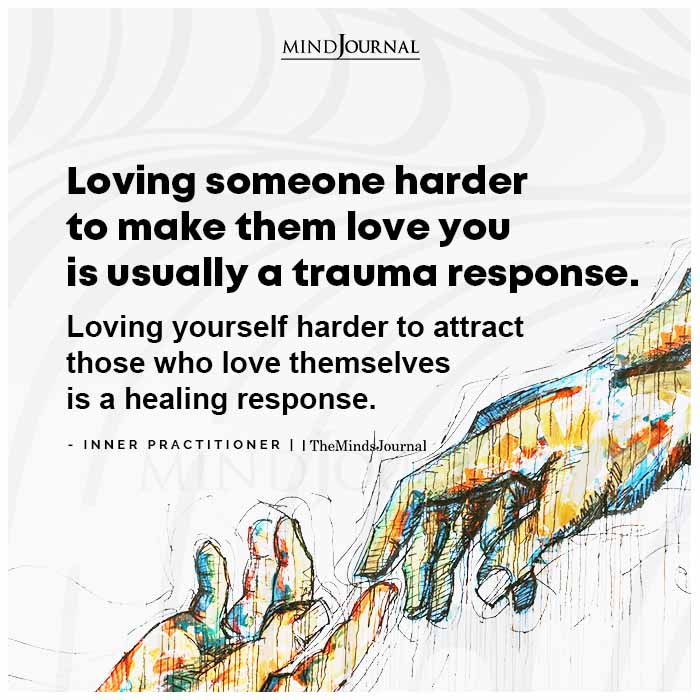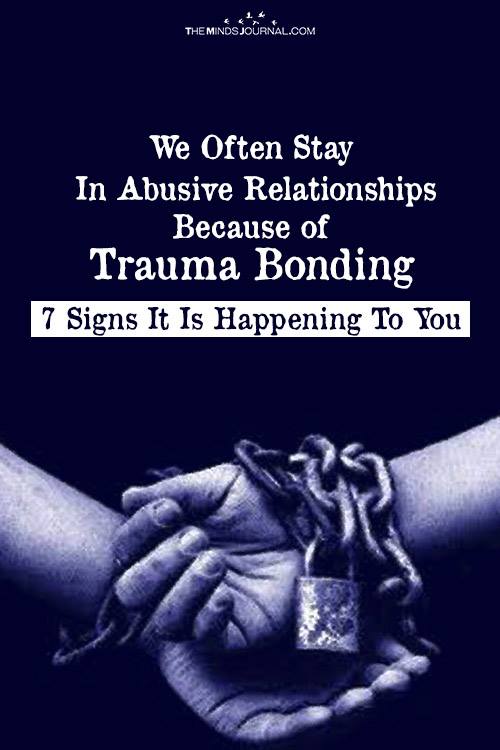Survivors of abusive relationships often choose to stay in the relationship with their abusive partners due to trauma bonding. Are you experiencing this too?
Trauma bonding is an inevitable aspect of any abusive relationship. However, it can often be difficult for the abused to identify while they are still in the relationship. As our narcissistic partner manipulates and controls us constantly, we often become stuck in a toxic cycle of abuse and seeking validation.
Related: Trauma Bonding Meaning: 5 Signs You Are In A Trauma Bond
What is trauma bonding?
Trauma bonding refers to the tendency of being loyal to someone who is toxic and destructive. The more your toxic partner controls and abuses you, the more you will seek love, respect, and validation from them.
In a romantic relationship, when one partner is repeatedly abused by the other over a long period of time, trauma bonding can occur. However, it can also take place in non-romantic relationships as well, like between friends, family members, and even coworkers.
The abuser will manipulate the abused partner in such a way that they will believe that abuse is normal in relationships. The abused will believe that it is their fault that their narcissistic partner is abusive. That they deserve to be abused by their toxic partner.
As the relationship progresses and evolves, the abused partner will become more insecure and increasingly seek validation and admiration from their narcissistic partner. As a result, the toxic partner will feel even more empowered, leading the way to further control and manipulation.
Trauma bonding makes us addicted to seeking validation and positive responses from our abuser repeatedly. It occurs as a result of recurrent cycles of abuse where intense emotional bonds are created through intermittent reinforcement of punishment and reward.
As these bonds are wired to resist change, it becomes gradually difficult for the victim to leave such abusive relationships.
We become growingly codependent on our abuser and eventually lose our sense of self in our attempts to please our narcissistic partner. The more we try to please them, the more they abuse us, and the harder it becomes for the abused partner to leave.

Signs of trauma bonding
Sometimes it can take months, if not years, to recognize that you are trapped in such a type of relationship and bonding. This is why it is crucial that you learn to identify some of the signs of trauma bonding.
Here are some of the common signs you need to look out for if you are in an abusive relationship:
- Although there is a steady pattern of abuse and non-performance, you keep on believing their lies and promises despite all signs pointing to the contrary.
- Even though you may not be affected by a certain behavior, action, or incident, your friends and family appear to be shocked, appalled, or disturbed by the fact that you accepted it from your partner.
- You feel helpless, trapped, and stuck as your narcissistic partner continues their destructive and toxic behavior.
- You try to play the “rescuer” by attempting to change your toxic partner into a “better” person. You try to help them get over certain bad habits, and addictions and be less destructive and non-abusive without making any progress.
- You and your partner engage in the same toxic arguments and fights for the umpteenth time. You fight about the same topics and same issues leading to the same outcomes.
- Although you may not trust or respect your partner or even like them anymore, you feel you cannot detach yourself from them.
- Every time you attempt to leave your narcissistic abusive partner, you end up missing them. The discomfort of being without your partner is so intense and you long for them so much that you falsely believe it’s better to tolerate their abuse than to be without them. You believe that they are the only person who will love you.
Related: Healing From Trauma Bonding: 4 Ways You Can Heal Trauma Bond After a Narcissistic Relationship
Trauma bonding is addictive
It’s like an addiction that you just can’t kick. Such addictive patterns are typically observed in unhealthy relationships dominated by inconsistent reinforcement, similar to alcoholics, drug addicts, and individuals in domestic violence settings.
It can also be observed in dysfunctional marriages as there are certain periods when the relationship appears “normal” to both partners. This type of bonding is also evident in religious cults, hostage situations, child abuse as well as toxic work environments.
Trauma bonds thrive in environments riddled with promise, inconsistency, complexity, and intensity. It is the lure of that illusory promise and the false hope for a better future. Manipulation forms a crucial part of such attachments.
As the abused partners are desperate for the payoff, they are willing to accept and tolerate all types of toxic and damaging behavior. It is the elusive promise and the constant hope of experiencing happiness and fulfillment of certain personal needs of the abused partner.
This is the reason why such bonding becomes addictive for the victim. Emotionally abusive relationships are like a roller coaster. There are periods of punishment and periods of intermittent reinforcement of kindness, displayed when the victim behaves according to the whims of the abuser. When we are trapped in this constant cycle of kindness and punishment, our mind gets addicted to it.
As we seek connection with our partners, we become dependent on getting approval from them, even at the cost of being abused and traumatized.

Protect the self
This is why it is crucial that you identify trauma bonding if you are in an abusive relationship and start taking steps to set up personal boundaries and protect yourself.
Once you begin to realize that you are being abused, you can finally see how damaging your partner truly is. You can realize why it’s imperative that you walk away from this abusive relationship to save your own self. Only then healing can truly begin.
Want to know more about the types of trauma bonding? Check this video out below!
Frequently Asked Questions (FAQs)
What are the 7 stages of trauma bonding?
The 7 stages of trauma bonding are love bombing, building trust and dependency, constant criticism, manipulating & gaslighting, gradually giving up, complete loss of self, and ultimately getting addicted to the cycle.
How to heal trauma bonding?
Some of the best ways you can heal your trauma bond are by practicing self-care, setting personal boundaries, building healthy relationships, addressing your symptoms of trauma and abuse, and most importantly going no-contact with your abuser.













Leave a Reply